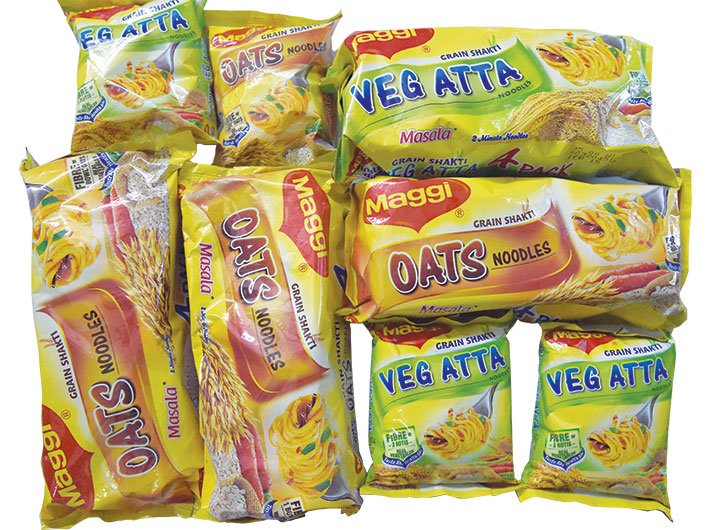India’s food products market is nearly '25 lakh crore and in the next five years it is expected to shoot over '40 lakh crore. In this scenario the role of the food regulator, Food Safety and Standards Authority of India (FSSAI), is crucial. However, the FSSAI is in a pathetic condition and its record of hauling up erring food products firms is far from satisfactory.
The Maggi noodle controversy should make the authorities and the civil society sit up and restore the house of FSSAI in proper shape. Otherwise, the health of the future generation is at risk.
Why such an alarmist stance? Here is the story of the regulator which has been bent, used, abused, shortchanged but has never shown guts to stand up and be counted.
Since its inception the FSSAI has become a body to accommodate retired bureaucrats looking for comfortable positions and a second innings to avail government facilities, no matter whether they have required technical knowledge or not.
“The authority is headed mostly by retired bureaucrats and only once someone with technical background was given a chance. Whether he is K Chandramouli as chairperson or VN Gaur as CEO, they are all bureaucrats and not technical persons,” said a retired official, who has served in the health ministry.
Chandramouli, an IAS officer of Uttar Pradesh cadre of 1975 batch, had the blessings of the then serving cabinet secretary, also from the UP cadre.
“Most of the retired bureaucrats are given a chance to serve for another five years as they enjoy government perks and facilities. They get to go abroad to attend meetings but do nothing on the ground,” said another retired official, who has held secretary-level postings in the central government.
The FSSAI has either remained headless or headed by retired bureaucrats. And to accommodate these bureaucrats rules were bent and changed. When Chandramouli was to be appointed, the retirement age was relaxed for five years. At that time the director general health services (DGHS), Dr RK Srivastava, had also applied as he wanted to continue in FSSAI after retiring at the age of 62 years.
However, changed rules denied him the post. “Rules were tactically framed to stop a technical person from FSSAI and a person of more than 62 years from applying to the post. Thus a technical person was prevented to join FSSAI and Chandramouli was given the post,” said a technical official of FSSAI, who refused to be identified.
This technical official further revealed that “even the advisory board contains some big names who have no time to look towards the betterment of FSSAI.”
When contacted, former DGHS Srivastva declined to speak on the relevance of the FSSAI. But he was willing to talk about the Maggi controversy. He said the need of the hour is the clinical study on the issue of lead present in our food. “There should be a retrospective study of the effect of Maggi used in last 20 years so that the real source of lead could be known,” Srivastava demanded.
He sought a serious and professional body to look after the quality of food as no nation can afford to compromise on the health of its coming generation. Dr Srivastava gave the example of autism occurring in one out of every 5,000 children. Lead may be the one of the causes as the central nervous system is badly affected by it, he said.
As per World Health Organisation (WHO), lead exposure causes death of 1,43,000 people in a year in the world and most of them are from the developing countries.
Apart from the controversy over the head of the FSSAI, there is an issue of shortage of staff.
It is the most neglected department as posts are lying vacant in the capital Delhi itself. In Delhi, two-thirds of the posts are vacant and out of 32 food safety officers only 12 officers are available to check adulteration of food products. Most of the vacancies are more than a year old.
Even the testing laboratories of the FSSAI are in pathetic condition. Delhi labs face almost 75 percent of staff shortage. Because of such shortage, test reports take more than 20 days of preparation while it should be over in three to four days.
There are around 130 countries where Maggi is being sold and the gross domestic sales of Nestle in India in 2014 were '10,129 crore.
How such a big volume was being sold without being noticed is the question that needs answer.
In 2011-12, 64,593 samples were examined and 764 penalties were imposed in the country. In 2012-13 it grew to 3,175 convictions and '5.25 crore was recovered in penalties. In 2013-14 it went higher at 3,835 and '7.30 crore penalty was recovered.
There is a large number of states whose record is poor in terms of food adulteration investigations. For 2012-13, Jharkhand, Lakshadweep, Tripura and West Bengal show no record as per the FSSAI website. In West Bengal only 91 samples were checked and 41 of them were declared misbranded but no penalties and conviction could be slapped. In Bihar too, in 2012-13, the samples in the range of 371 were declared misbranded but not a single rupee was collected as penalty. Similarly in Haryana out of 1,500 samples 235 were misbranded and 131 cases were lodged but neither a single conviction could happen nor penalties were recovered.
“Actually there are always two lines of manufacturing in India. One is for poor people like we Indians and the othee is for Singapore and Europe. Since our regulatory body and industries have no transparency and accountabilities, we are provided harmful products,” said Bijon Misra who was an FSSAI member in 2011-13. “We have a robust body but it lacks leadership as the top two posts are given to retired bureaucrats who keep fighting for their influence,” he said.

